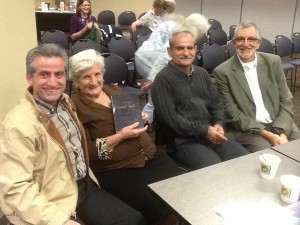

Courtesy Photo
By Linda Nguyen
Staff Writer
Bible translating has become a family activity for a Baylor Arabic professor, his brother and mother.
Dr. Abdul-Massih Saadi, lecturer in Arabic in the modern foreign languages department, has recently completed the translation and publication of the New Testament into colloquial Arabic and modern standard Arabic.
This is the first time a piece of literature has been translated into colloquial Arabic.
“For the whole Arabic speaking world, there is no New Testament version for colloquium,” Saadi said. “In fact, there is no literature in colloquium at all in Arabic history.”
Saadi said he also used the Aramaic version of the Bible rather than the Greek version to do his translations, which was also unique to other Arabic translations of the Bible.
“I used the Greek to consult with the Aramaic. Most of the time they agreed with one another,” Saaid said.
Saadi said the idea first came to him about 30 years ago when he was teaching in a monastery.
“I was the principal of the monastery,” Saadi said. “I gave my students an assignment to translate a passage from the standard to the colloquial. I asked every student to translate to their mother tongue dialect. As a result, everybody found a tremendous treasure and hidden meaning in what each student did.”
Saadi said the assignment was controversial because many people in the Middle East thought Classical Arabic was the holy language and the other dialects should not be spoken in any respected place such as professional or religious settings.
“That’s been proven to be wrong,” Saadi said. “Ultimately, the Gospel itself was written in the colloquial language, colloquial Greek, and when it was translated to Aramaic, it was the colloquial Aramaic.”
Saadi said the actual translation of the New Testament began 15 years ago during his time as a graduate student.
“I was introduced to people from Wycliffe Bible translation,” Saadi said. “We were chatting about my idea and they told me, ‘How about if we encourage you to do this.’ With their resources we undertook this project. We took it as a family.”
Saadi’s brother, Saad Saadi, said he was blessed to have been a part of the translation.
“I’m very, very happy to see this translation in a book and knowing many people will enjoy it,” Saad Saadi said. “Thousands of people will enjoy it.”
Saad Saadi said his family enjoyed the work of translating the Bible and each had something to contribute to the translation.
Abdul-Massih Saadi’s knowledge of Greek and Hebrew, his brother’s knowledge of the Arabic and Syriac language and their mother’s help listening and giving feedback on their translations helped complete the work.
“We were enjoying the work together,” Saad Saadi said. “It’s like we were enjoying each other on the table of Jesus.”
Saad Saadi said he personally felt called by God to contribute to the translation.
“This was the most enjoyable task I’ve ever gotten involved in and I want to thank God for giving me this chance, this gracious chance, to serve his word to translate and to reach more people in the world,” Saad Saadi said.
Abdul-Massih Saadi said he and his brother repeatedly read their translations to their mother, Evelyn Saadi, and asked her to repeat it back to them in her own words.
“We read it for her multiple times,” Saadi said. “She would repeat whatever we told her in our own words and we got that as our feedback.”
Abdul-Massih Saadi translated for his mother as she remarked on her experiences working on the Bible translation.
She said she remembered reading the translations to people who were illiterate because they wanted to make sure people from all walks of life understood their translations.
“Some of the illiterate people enjoyed it and they were telling us, ‘Without you, we would not be able to understand,’” Evelyn Saadi said. “They suggested us to put the gospels on audio so they can listen. They were saying that we were the only source for this. They were happy about it too and of course we were happy and ultimately this is the happiness of God that he’s provided to us and wants us to share.”
Abdul-Massih Saadi said they are currently translating the Old Testament and hope to publish some Old Testament books such as the Book of Psalms by the time the second edition of the New Testament comes out.





